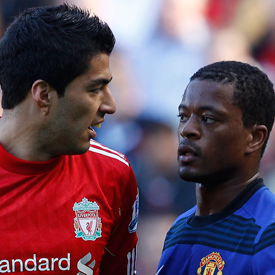FA takes moral stand against casual racism
Suarez may not have intended to be racist, but that’s beside the point – the FA ruling is about casual racism and words, says sports reporter Keme Nzerem.

This is a big big day for English football. The FA can be accused of many things but with Luis Suarez’s unprecedented eight-match ban they have taken a clear moral stand against the use of racist language.
Liverpool striker Suarez repeatedly called the Manchester United player Patrice Evra “negrito” during a match in October. The pair had been sniping at each other all game. Suarez rather tenuously argued his use of the word was a Latino term of endearment. Evra heard it as a racist slur.
The insults may well have been escalated by Evra hurling a racial epiphet of his own – calling Suarez a “South American”. Nonetheless the FA investigative panel believed Evra’s account, that he had been racially abused, whatever Suarez’s intent.
Liverpool suggested Evra was untrustworthy, that he’d falsely accused others of racism before. And they said because he was the only person to have heard the offending words, the case was one man’s word against another’s, and it should be thrown out.
But more pertinently, Liverpool also claimed Suarez can’t be racist because his grandfather is black.
About words, over intention
So did Suarez really mean to wound Evra? Did he understand how upsetting his words would be? Or as far as he was concerned, was it just part of the cut and thrust of the game where all players are equal and the colour of one’s skin matters not a jot?
Liverpool FC, Suarez himself, even his accuser Patrice Evra, have all said they don’t believe Suarez is a “racist”, but in a sense that misses the point. It’s about words.
Anyone can use racist language. But most people understand what the impact would be. Most people wouldn’t use racist language. Most people don’t use racist language.
But racist abuse is something that wounds black players in a way nothing else can. And now the FA has made it clear in the strongest possible terms that using words like “negrito” is unacceptable.
All players gripe and sledge, to borrow another sporting term. And the public perception is that for years now both the terraces and the pitch itself have been cleansed of the more egregious racist banter that used to plague black players up and down the country.
Decision due on John Terry
But now two cases in the most cosmopolitan and popular football league in the world have burst this bubble.
Players still all too easily slip into issuing casual racist insults. Not just Suarez, but it’s claimed, the England captain no less. A man with several black players on both his club and national team. A man who – if he’s charged – should have known better.
The CPS decide later today whether John Terry did call Anton Ferdinand – the brother of the former England captain Rio Ferdinand – a “black ****”. And if he did, was it just a moment of madness, or did he really mean it?
Is John Terry “racist”? Is Luis Suarez ‘racist’? Did they realise the power and weight of their words? Or are they people who ignorantly deployed racist language? There is a difference. But intent matters little to the person who hears it.
The FA have rightly sent the message that racist language cannot be tolerated.
It is in stark contrast to the Fifa President Sepp Blatter, who suggested last month that anyone on the receiving end of a racist tirade should simply shake hands after the match and forget about it.
-
Latest news
-
Boy with profound learning disabilities reaches out of court settlement after abuse in residential school7m

-
India election: Modi rivals hit by string of raids and arrests7m

-
Can UK’s abandoned mines be used to build a greener future?5m

-
Sycamore Gap: Man pleads not guilty to felling iconic tree2m

-
‘Child poverty has not fallen since Tories came in’, says Gordon Brown5m

-




